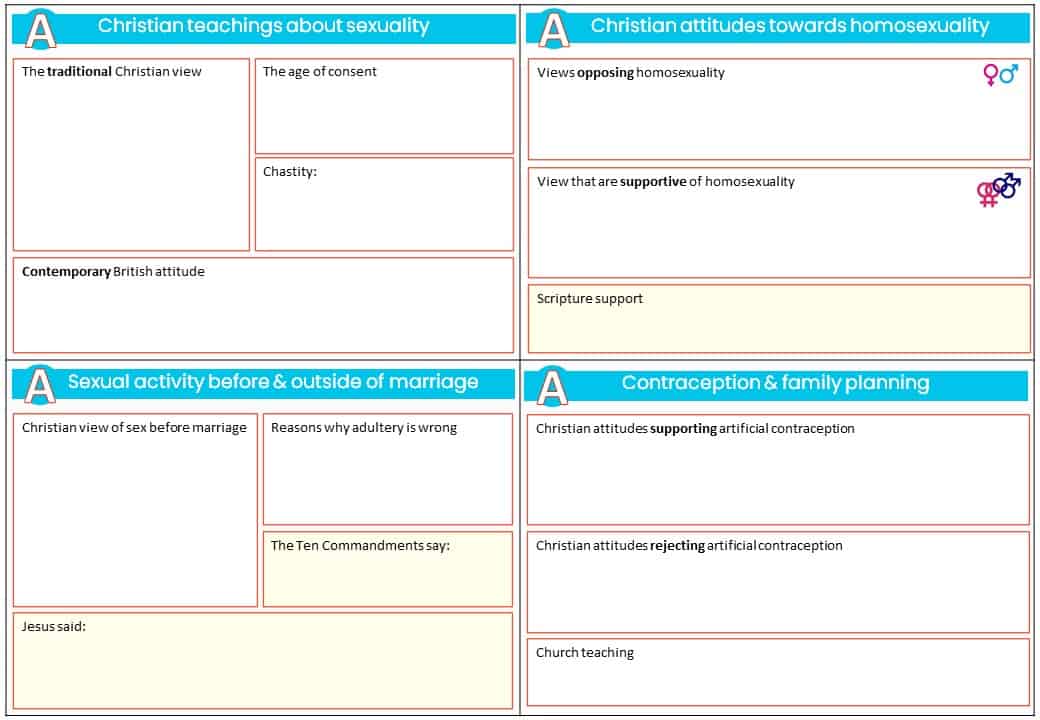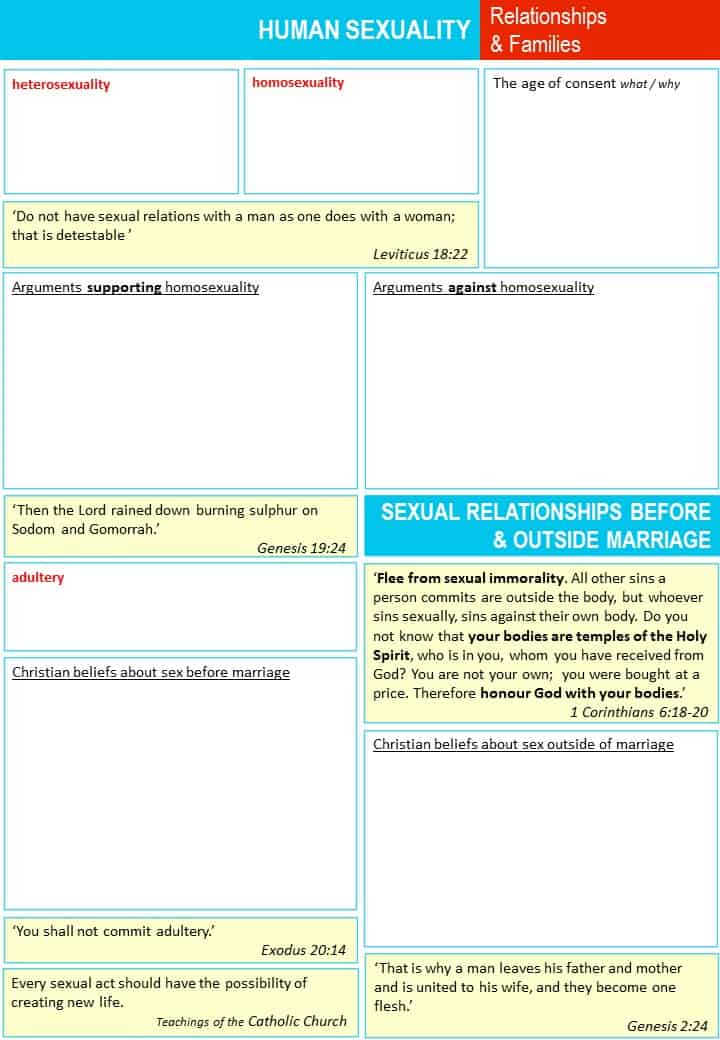Theme A
Relationships and families
Sex, marriage and divorce
- Human sexuality including: heterosexual and homosexual relationships.
- Sexual relationships before marriage.
- Same-sex marriage and cohabitation.
You must be able to explain contrasting beliefs on the following three issues with reference to Christianity and one or more other religious traditions.
Homosexual relationships & same-sex marriage
‘It is wrong to disapprove of homosexual relationships.’ (12)
2019
Arguments in support
• Homosexual (same-sex) relationships exhibit the same characteristics found in other
relationships and marriages, love, care, trust, faithfulness etc.
• ‘God is love’ so surely if any couple love each other that has to come from God.
• How can something God created be wrong?
• Modern day same-sex relationships are very different from the same-sex relations that are condemned in some sacred writings.
• Law in the UK permits same-sex marriages so religious believers should not be so critical, etc
Arguments in support of other views
• Some religious people see same-sex attraction as being against natural law.
• Some religious teachings condemn same-sex relationships; religious authority cannot be explained away because it is seen as old and inconvenient.
• In much religious thought there is great emphasis on having children, this cannot occur biologically between a same-sex couple without a surrogate or donor.
• Some people believe that human sexuality is a choice made by the individual.
• Much traditional religious teaching is focused on the continuation of family and communities hence the focus on heterosexuality, etc.
Christianity
- Homosexuality is seen as wrong by some Christians though attitudes are changing
- Some branches of Christianity eg Quakers accept same-sex relationships
- others question the traditional application of the teachings on sexual relations
- God created humans, ‘and it was very good’ (Genesis 2) regardless of their sexuality
- God recognises that ‘it is not good for man to be alone’ (Genesis 2)
- much New Testament teaching is built around the condemnation of cultic prostitution in the temples and maintaining a lifestyle distinct from those who worshipped in the various temples so is not really easily applied to a loving same-sex relationship
- ‘Even women pervert the natural use of their sex by unnatural acts. In the same way the men give up natural sexual relations with women and burn with passions for each other.’ (Romans 1:26–27)
- some Christians distinguish between sexual orientation and sexual acts and regard only the latter as sinful
- the Metropolitan Community Church is a worldwide denomination that has grown from the LGBT community and therefore accepts all relationships, etc
Judaism
- The Torah lists punishments for homosexual acts
- some Orthodox Jews consider it to be wrong because it says ‘No man is to have sexual relations with another man; God hates that.’ (Leviticus 18:22)
- many Liberal and Reform Jews accept homosexuality if it is within a loving relationship
- The Central Conference of American Rabbis in 1998 stated that the holiness within a Jewish marriage ‘may be present in committed same gender relationships between two Jews and that these relationships can serve as the foundation of stable Jewish families, thus adding strength to the Jewish community.’
Give two religious beliefs about same-sex marriage. (2)
2018
- Marriage is seen as the right place for sex with the possibility of raising children. As same sex couples cannot have children some would ask why marry?
- Marriage is seen as the place of comfort and mutual support and the right place to express love between people so some religious believers support same-sex marriage.
- Homosexual relationships are considered by some to be morally wrong so same-sex marriage would not be supported some religious believers support same-sex marriage as it is part of a loving, caring relationship.
- Some religions advise celibacy (within marriage) for same sex couples.
- God created everyone including homosexuals so same-sex marriage is acceptable.
Explain two religious beliefs about same-sex marriage. (5)
2022
Generally opinions within religions will vary on this topic between liberal and more
traditional believers. Those who accept homosexuality may or may not accept same-sex marriage. Whilst those who oppose homosexuality will usually oppose same-sex marriage.
Some might draw a distinction between accepting marriage but not permitting a religious marriage ceremony but holding a blessing ceremony.
Credit responses about same-sex marriage ceremony eg. use of religious venue, promises / vows, etc.
Traditionally marriage is seen as part of God’s plan resulting in procreation / raising a family / samesex marriage is unable to produce children naturally / may be regarded as against natural law / not part of God’s intention for humanity / therefore it is wrong.
The reasons for marriage are as valid for same-sex couples as for heterosexual couples / marriage is more than having children / not all heterosexual marriages result in children / place for growing in love / place for companionship / comfort and help each other / right place for a sexual relationship / therefore same-sex marriage is not wrong.
Christianity
Sees marriage as a covenant between the couple and God / to live faithfully together until death / spiritual bond of trust reflects the love of God for the Church / proper place for sex / providing secure and stable environment for the family / all of which could apply to a same-sex marriage
Roman Catholic Church teaches homosexual activity is sinful and so would not support same-sex marriage / considered to be against natural law / ‘And with a male you shall not lie as one lies with a woman…’ (Leviticus 18:22) / Church of England does not allow same-sex marriage in church
Other churches such as Quakers do allow it, etc.
Judaism
Orthodox Jews do not support same-sex marriage / ‘And with a male you shall not lie as one lies with a woman…’ (Leviticus 18:22)
Orthodox Jews follow Genesis ‘be fruitful and multiply’ (Genesis 1:28) / so same-sex marriage would not fulfil this duty.
Liberal and some Reformed Jews accept same-sex marriage / some are willing to bless or conduct same-sex marriages in a religious ceremony, etc.
Explain two contrasting religious beliefs about same-sex parents. (4)
Spec 2
in general, a contrast can be drawn between religious believers who accept homosexual relationships and therefore are likely to accept same-sex parents and those who do not. Opinions within religions vary between liberal and more traditional believers
• traditionally religions have taught that homosexual relationships, particularly male homosexual relationships, are not part of God’s intentions for humanity/not part of the natural law/are therefore wrong, etc
• heterosexual relationships provide the role models children need to grow and develop within a family/heterosexual relationships are part of God’s plan for procreation/raising a family, etc
• other religious believers hold the belief that people’s sexual orientation has nothing to do with whether or not they would be good parents/homosexuality is not wrong/a faithful, committed relationship is more important for bringing up children, etc
• children need a secure and loving family which is more important than the sexual orientation of the parents/the most loving thing is to adapt religious teachings to the modern world, etc.
Christianity
Some believe same-sex parents is unnatural and unhealthy as heterosexuality is God’s plan for raising children/the Bible says that it is wrong for a man to sleep with a man ( Leviticus 18:22/1 Corinthians 6:9–10) so fundamentalists oppose same-sex parenting/others do not oppose same-sex parenting for those who live in a faithful and
committed relationship, etc.
Judaism
The Torah forbids a sexual relationship between two people of the same sex. Leviticus 18:22/men and women have specific roles for parenting so same-sex parenting is opposed particularly by Orthodox Jews/some Reform and Liberal Jews accept homosexuality if in a loving relationship, etc.
Explain two religious views about same-sex parents. (5)
2020
Generally, opinions within religions will vary on this topic between liberal and more traditional believers. Those who accept same-sex relationships are likely to accept same-sex parents whilst those who oppose homosexuality will also usually oppose same-sex parents.
Traditionally heterosexual relationships are seen as providing the role models children need to grow and develop within a family / heterosexual relationships are part of God’s plan for procreation / raising a family / therefore same-sex relationships are not seen as part of God’s wider plan for procreation/ they are not part of natural law / they may therefore be considered to be wrong, etc.
Other religious believers would argue that a person’s sexual orientation has nothing to do with whether or not they would be good parents / same-sex relationships and orientation are not wrong / a faithful committed relationship is more important for couples who are bringing up children, etc.
Children need a secure, stable and loving family and that is more important than the sexual orientation of the parents.
Christianity
Based on teaching in Genesis 2 of a man leaving his parents and becoming one with his wife, Christianity has taught that a heterosexual relationship is God’s plan and as part of that children will be born and raised / therefore some may believe same-sex parents to be unnatural/ may not be God’s plan for procreation / many fundamentalists oppose same-sex parenting / other Christians do not oppose any people in a faithful and committed relationship raising children, etc.
Judaism
Men and women have specific roles in parenting so same-sex parenting is often opposed by Orthodox Jews / The Torah forbids a sexual relationship between two people of the same sex (Leviticus 18:22) / many Reform and Liberal Jews accept loving same-sex relationships / so may support same-sex parenting / the most important thing being that the children are raised in a secure, loving environment, etc.
Sexual relationships before marriage & cohabitation.
Give two religious reasons given by believers to support the view that sex before marriage is wrong. (2)
2021
- Many religious believers view sex before marriage as wrong believing that sex is a gift from God that should be managed responsibly
- Sex before marriage is therefore viewed as irresponsible as people run the risk of unwanted pregnancy or STIs
- ‘One-night stands’ treat sex as casually and disrespectfully rather than expressing a deep life-long commitment to a partner
- within marriage sex strengthens the relationship / allows for children to be born in a stable relationship / creating a family through which religion and culture can be passed down, etc
Christianity teaches sex should be reserved for marriage only / ‘Every sexual act must be within the framework of marriage’ Catholic Catechism /
- ‘That is why a man leaves his mother and father and becomes united with his wife’ (Genesis 2:25)
- ‘Flee from sexual immorality’ (1 Corinthians 6:18)
- Within Judaism sex before marriage is seen as undermining the creativity of the family / it lowers a person’s self-respect /
- all are created in God’s image (Genesis 1:27)
- ‘That is why a man leaves his mother and father and becomes united with his wife’ Genesis 2:25)
Explain two contrasting religious beliefs about unmarried couples living together (cohabitation). (4)
2019
Traditionally most religions see cohabitation as wrong as they believe that a sexual relationship should only take place within marriage. Cohabitation is therefore viewed as sex outside of marriage and not in line with much religious teaching, etc
Christianity
- Most Christians believe sex should be reserved for marriage
- cohabitation is seen as wrong as this leads to immorality / ‘Flee from sexual immorality…Whoever sins sexually, sins against their own body’ (1 Cor 6:18).
- Some Christians see cohabitation as acceptable if the couple are in a loving relationship and are intending to marry but perhaps are unable to afford to marry
- other Christians would view cohabitation as acceptable if for example the couple were homosexual and were unable to have a religious marriage ceremony, etc
Judaism
- Family is very important within Judaism and so anything that does not support the family is seen as wrong
- cohabitation is seen as not ideal / the expectation is that sex would be within marriage, etc
‘For religious believers, sexual relationships should take place only within marriage.’ (12)
2018
Arguments in support
- Most religions traditionally teach that all sex outside of marriage as wrong.
- Sex is seen as an expression of what should be a deep, life-long commitment and loving union.
- Sex is seen by many religious believers as a gift of God.
- Sex is a complete self-giving of a husband and wife to each other.
- Adultery is a betrayal of trust and breaks the marriage contract. Adultery causes pain between couples.
- Married couples may provide a more stable environment for raising children.
- Sex outside of marriage may have unwanted consequences.
- Sex outside of marriage may undermine self-respect.
Arguments in support of other views
- If the couple are in a long-term relationship, why should they not be able to show their love for each other?
- Couple may be homosexual and not able to have a religious marriage ceremony
- Expense of wedding may mean couple cannot afford to marry
- There is a difference between a committed faithful relationship and casual sex
- Given free will so able to make own decisions
- Many couples are not married and provide a stable environment for raising children
- Couple may not see need for a ‘bit of paper’, etc.
Christianity
- Christianity teaches that ‘the body is a Temple of the Holy Spirit’ (1 Corinthians 6) so is worthy of respect.
- ‘For this reason a man will leave his mother and father and be united to his wife, and they will become one flesh’ (Genesis 2:24).
- ‘Flee from immorality’ (1 Corinthians 6)
Judaism
‘Do not covet another man’s wife.’ (Exodus 20)
‘You shall not commit adultery’ (Exodus 20)
The Torah lists punishments for sex before marriage and adultery, which in the past included the death penalty, etc.
Resources
Videos

Christian teaching about sexuality

Teachings about homosexuality


